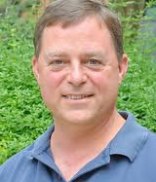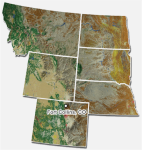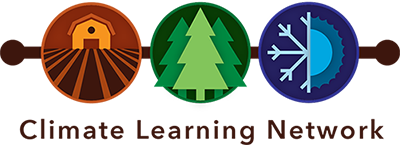Webinar 3: Vulnerability Assessments – What we did and what we’ve learned. September 15th, 2015 1:00pm EDT
 Dr. Chris Swanston is the project lead for the Climate Change Response Framework (CCRF) project, a collaborative, cross-boundary approach among scientists, managers, and landowners to incorporate climate change considerations into natural resource management. Dr. Swanston will present on how the CCRF has collaborated to create 9 vulnerability assessments on forests across 19 states, involving hundreds of collaborators and co-authors since 2010. He will discuss the process to create vulnerability assessments and a few lessons learned since the process began.
Dr. Chris Swanston is the project lead for the Climate Change Response Framework (CCRF) project, a collaborative, cross-boundary approach among scientists, managers, and landowners to incorporate climate change considerations into natural resource management. Dr. Swanston will present on how the CCRF has collaborated to create 9 vulnerability assessments on forests across 19 states, involving hundreds of collaborators and co-authors since 2010. He will discuss the process to create vulnerability assessments and a few lessons learned since the process began.
https://attendee.gotowebinar.com/register/3818542679698896642
Webinar Announcement: A Method for Building Trust and Collaboration in Addressing Climate Change Impacts (Part 1 – Working with Cooperators)
 Dr. Steve McNulty the Southeastern Regional Climate Hub (SERCH) Director will present his ELFLAND method for communicating climate change. ELFLAND is a method that teaches trust building to develop a realistic dialogue about climate change with diverse audiences.
Dr. Steve McNulty the Southeastern Regional Climate Hub (SERCH) Director will present his ELFLAND method for communicating climate change. ELFLAND is a method that teaches trust building to develop a realistic dialogue about climate change with diverse audiences.
Please register for CLN Presents: A Method for Building Trust and Collaboration in Addressing Climate Change Impacts (Part 1 – Working with Cooperators) on August 6, 2015 1:00 PM EDT at:
https://attendee.gotowebinar.com/register/3821099043217205505
After registering, you will receive a confirmation email containing information about joining the webinar.
Climate Learning Network to Launch Webinar Series

A Method for Building Trust and Collaboration in Addressing Climate Change Impacts
Part 1 – Working with Cooperators
Speaker: Steve McNulty, Director Southeastern Regional Climate Hub
Date: August 6, 2015 1:00pm EDT
Register: https://attendee.gotowebinar.com/register/3821099043217205505
A Method for Building Trust and Collaboration in Addressing Climate Change Impacts
Part 2 – Speaking to the General Public
Speaker: Steve McNulty, Director Southeastern Regional Climate Hub
Date: August 20, 2015 1:00pm EDT
Register: https://attendee.gotowebinar.com/register/6816548048790771713
Climate Risk Assessment for Foresters
Speaker: Chris Swanston (Northern Forests Sub-Hub)
Date: September 3, 2015 1:00pm EDT
Register: Coming Soon
Agricultural Climate Adaptation Practices
Speakers:Brenda Ortiz (Auburn University), Clyde Fraisse (University of Florida), Mark Risse (University of Georgia)
Date: September 17, 2015 1:00pm EDT
Register: Coming Soon
More webinars will be announced shortly. The webinars will be free and open to the public. Please feel free to pass this information on to anyone that might be interested.
Climate Hubs Needs Assessment Completed
 The CLN has completed a Needs Assessment of all 7 USDA Regional Climate Hubs and the 3 Sub-Hubs. The assessment was conducted via individual interviews with each of the Hub and Sub-Hub leaders. The process proved to be very useful for both the Hub leadership and the CLN. Through the interviews the CLN identified trends and limiting factors for the Hubs. The process also revealed the unique character of each hub and sub-hub.
The CLN has completed a Needs Assessment of all 7 USDA Regional Climate Hubs and the 3 Sub-Hubs. The assessment was conducted via individual interviews with each of the Hub and Sub-Hub leaders. The process proved to be very useful for both the Hub leadership and the CLN. Through the interviews the CLN identified trends and limiting factors for the Hubs. The process also revealed the unique character of each hub and sub-hub.
Overall trends among the hubs include:
- There is a need in many of the Hubs for increased translational capacity to convert the products from research to outreach tools useful for reaching Hub stakeholder audiences. Specifically identified as useful is the development of train the trainer tools for Extension audiences.
- The unique geography and needs of each hub region result in diverse needs for regional stakeholders. Therefore it is necessary to consider specific needs when developing tools for each region. A mix of Hub targeted training and broader, national and global tools will likely provide the most effective path for training stakeholders.
- Many Hubs are currently involved in preliminary relationship building with their stakeholders and it is anticipated that a better understanding of their needs will develop as these relationships mature.
The final 56-page document is under review now and will be released shortly. Stay tuned to the CLN for a download link.
Northern Plains Regional Climate Hub Hosts University Kick-off meeting

The NPRCH had their ‘university’ kick-off meeting June 10–11, 2015, in northern Colorado. The event brought six land grant universities together to share their existing extension and outreach efforts related to climate science and agriculture production. This gathering provided an opportunity to share and discuss other existing efforts (e.g., Western Water Assessment’s Climate Dashboard, and the Agriculture, Forestry, and Climate Science Learning Network pilot project).
A highlight from the 2-day event was the time the group took exploring opportunities to partner in the coming year. Through this effort, the group is writing a white paper for current status of activities, and inventorying existing climate science extension and education efforts that will showcase opportunities to fill in the gaps. The group discussed the need to train extension educators/agents about climate science, and how it might relate to their existing programs.

The NPRCH looks forward to working with the land grant universities among our other partners.
To learn more about the NPRCH visit: http://climatehubs.oce.usda.gov/northernplains
